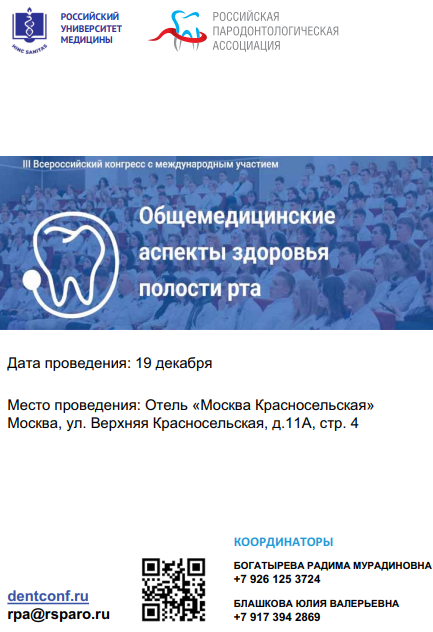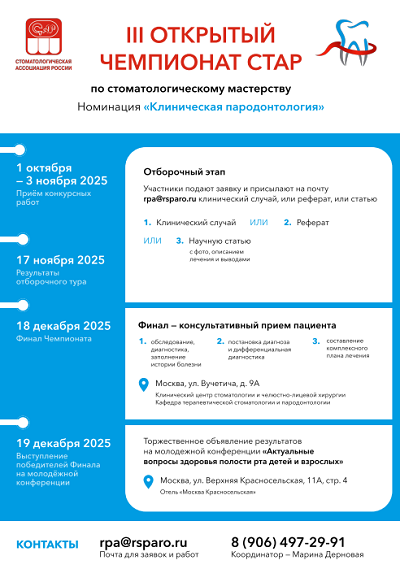Corrective effect of immunological drugs on oral microbiozinosis in patients with chronical apical periodontitis against the background of oral dysbiosis
https://doi.org/10.33925/1683-3759-2019-24-2-173-177
Abstract
Relevance. One of the main causes of periodontitis is oral dysbiosis, in which changes in the quantitative and qualitative composition of the microflora occur, the systems of interaction between the microorganism and the microbiota are disturbed, and immunity is reduced. Is to study the comparative anti-disbiotic efcacy of various immunobiological preparations in patients with chronic apical periodontitis against the background of oral dysbiosis.
Materials and methods. The study included 66 patients who were divided into 2 groups: comparisons (n = 34) and main (n = 32). Each group was divided into three subgroups depending on the degree of dysbiosis of the oral cavity according to the method of A.P. Levitsky (2007): determination of the ratio of the relative activities of urease and saliva lysozyme. All patients underwent traditional endodontic treatment and oral hygiene with parallel correction of oral microbiocenosis through the use of a complex of immunomodulatory drugs to patients of the main group.
Results. In chronic apical periodontitis, urease activity was signifcantly increased, and in those examined with grade II-III dysbiosis almost 2 times compared with patients with grade I severity of clinical manifestations. The proposed treatment reduced the activity of urease in patients in all three subgroups of both groups (main and comparison). The results indicate a signifcant decrease in the activity of lysozyme in all patients more than 2 times. Conducted traditional treatment (comparison group) increased activity, but did not lead to a recovery in the rate of healthy individuals. The use of immunomodulatory drugs allowed to increase the level of lysozyme to the indicators of the control group.
Conclusions. The inclusion of immunobiological preparations in the complex therapy of chronic apical periodontitis against the background of oral dysbiosis eliminates the dysbiotic phenomena in the oral cavity and has a therapeutic effect on destructive processes in the periapical tissues that are difcult to treat and often recur.
About the Authors
N. I. ChepurovaRussian Federation
Assistant
Simferopol
I. G. Romanenko
Russian Federation
PhD, MD, Professor, Head of the Department
Simferopol
References
1. Максимовский Ю.М., Митронин А.В. Терапевтическая стоматология. Кариесология и заболевание твердых тканей зубов. Эндодонтия: учебное пособие. Москва: ГЭОТАР-Медиа. 2014. [Необходим перевод на английский (In Russ.).
2. L.Yu. Orekhova, L.P. Shajda, R.V. Chornyj, Е. А. Zernickaya, A. A. Saunina. The reasons for persistence the periapical focus of infection after endodontic treatment. Ways to resolve the issue. Endodontics Today. 2018;2:64-69 (In Russ.).
3. S.Y. Chen, H.L. Wang, G.N. Glickman The influence of endodontic treatment upon periodontal wound healing. J. Clin. Periodontol. 1997;24(7):449-456.
4. J.I. Ingle, L.K. Bakland, J.C. Baumgarther. Endodontics. 6 th ed. BCDecker, 2008.
5. A.V. Mitronin. Features of the development, course and treatment of chronic apical periodontitis in patients with comorbidities (literature review). Dentist. 2006;7:7-15 (In Russ.).
6. A.V. Mitronin, I.D. Ponyakina. Study of the effect of chronic apical periodontitis on the patient's body condition. Dentistry. 2007;86(6):26-29 (In Russ.).
7. A.V. Vasil'ev, K.P. Pimenov, A.F. Kerzikof. Сhronic odontogenic infection and septic endocarditis. Periodontics. 2019;24(1):11-14 (In Russ.).
8. P. Blackburn, J. Pollack. Structure of the cell wall of Staphylococcus aureus IX. Mechanism of hudrolysis by the L11 enzyme. Eur Pat. 1990.
9. J.H. Meurman. Dental infections and general health. Quintessence Int. 1997;28(12):807-811.
10. E.B. Fowler, L.G. Breault, M.F. Cuenin. Periodontal disease and its association with systemic disease. Mil. Med. 2001;Jan:166:1:85-90.
11. A. Yenn-Tung, W. Teng George, F. Taylor. Scannapieco Periodontal health and systemic disorders. J. Can. Dent. Assoc. 2002;68:3:188-192.
12. V.I. Samohina, O.V. Mackieva, V.D. Landinova. Comparative characteristics microbial colonization apical part of the tooth roots in a state of chronic infl ammation. Endodontics Тoday. 2015;4:47-50 (In Russ.).
13. I.G. Romanenko, N.I. Chepurova. Influence of dysbiotic factors on immune disorders in odontogenic foci of infection (literature review). Crimean therapeutic journal. 2017;3:43-46. (In Russ.).
14. I.G. Romanenko, N.I. Chepurova. The role of oral dysbiosis in the development of oral diseases (literature review). Endodontics Тoday. 2016;2:66-71. (In Russ.).
15. S.M. Gorobec, I.G. Romanenko, А.А. Dzherelej, S.A. Bobkova, D.Yu. Kryuchkov, O.V. Gorobec. Dental aspects of manifestation undersirable medicine reactions. Tauride Medical-Biological Herald. 2018;3:166-174 (In Russ.).
Review
For citations:
Chepurova NI, Romanenko IG. Corrective effect of immunological drugs on oral microbiozinosis in patients with chronical apical periodontitis against the background of oral dysbiosis. Parodontologiya. 2019;24(2):173-177. (In Russ.) https://doi.org/10.33925/1683-3759-2019-24-2-173-177




































